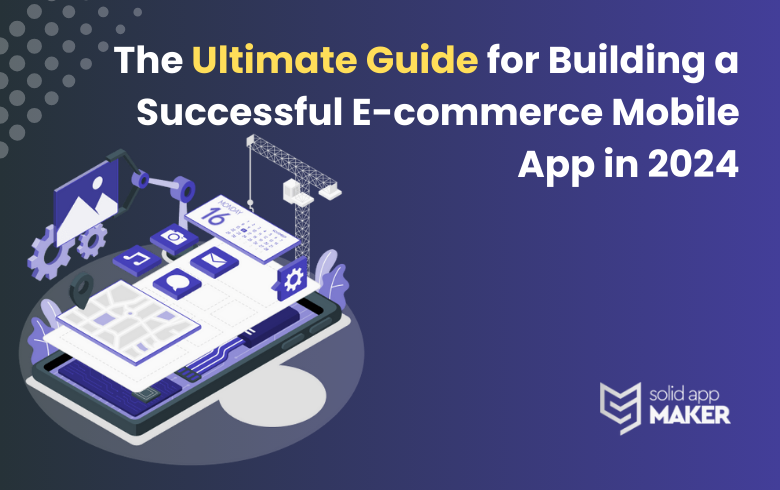Step into the future of e-commerce with our guide to building a successful mobile app in 2024. Digital shopping is not just a trend but a way of life, having a powerful mobile app is the key to unlocking success for online businesses.
This guide is your compass through the intricacies of mobile app development for e-commerce, offering insights and strategies to ensure your mobile app not only meets but exceeds the expectations of your users.
Join us as we embark on a journey to master the art of crafting victory in the dynamic world of E-commerce mobile app development.
Top Reasons for Developing an E-commerce App
Developing an e-commerce app is imperative for several compelling reasons. It provides businesses with a direct and personalized channel to engage with their customers, fostering brand loyalty and repeat business. The convenience of mobile shopping cannot be overstated, and an app ensures that your products and services are just a tap away, enhancing accessibility for users.
Moreover, e-commerce apps empower businesses to leverage user data and analytics, enabling targeted marketing campaigns and personalized recommendations. The seamless and secure payment options in a dedicated app contribute to a frictionless customer experience, boosting sales and customer satisfaction.
In essence, an e-commerce app serves as a strategic tool to meet evolving consumer expectations, stay competitive, and carve a niche in the ever-expanding digital marketplace.
Understanding the E-commerce Landscape in 2024
In 2024, the e-commerce landscape is more dynamic than ever. With a significant shift towards mobile shopping, businesses need to adapt to this trend to stay competitive. According to recent statistics, mobile devices account for over 60% of online purchases. Understanding these trends is crucial as you start the journey of developing your e-commerce mobile app.
Planning Your E-commerce Mobile App
Before diving into the technicalities, it’s essential to have a solid plan. Define your app’s unique selling proposition (USP) — what sets it apart from the competition?
Identify your target audience and market niche to tailor your app accordingly. Conducting a comprehensive competitive analysis helps you learn from successful apps and avoid common pitfalls.
Essential Features for a Successful E-commerce Mobile App
- Intuitive User Interface (UI) and Navigation: Your app’s success hinges on a user-friendly interface. Ensure that navigation is intuitive, allowing users to find products effortlessly.
- Advanced Search and Filtering Options: Implement advanced search functionalities and efficient filtering options to enhance the user experience, making it easy for customers to find what they’re looking for.
- Secure Payment Gateways and Smooth Checkout Process: Security is paramount. Integrate secure payment gateways to instil trust and optimize the checkout process for a seamless user journey.
- Personalized User Experiences through AI and Machine Learning: Leverage AI and machine learning to personalize user experiences. From personalized recommendations to tailored promotions, these technologies enhance customer engagement.
Choosing the Right Technology Stack
Selecting the appropriate technology stack is a critical decision. Consider the latest mobile app development frameworks and choose a programming language that aligns with your project requirements. Integrating third-party APIs can enhance your app’s functionality and provide a better user experience.
Designing a User-Centric Mobile App
Responsive design is non-negotiable in today’s diverse device landscape. Ensure your app looks and functions seamlessly across various screen sizes. Incorporate user feedback and conduct beta testing to identify and rectify any usability issues before the official launch. An appealing visual design is essential for user engagement.
Mobile App Security Measures
Security breaches can severely damage your reputation. Implement robust security measures to protect user data and secure payment transactions. Regularly update security protocols to stay ahead of potential threats.
Optimizing for Performance and Speed
In a world where attention spans are short, quick load times are crucial. Optimize your app’s performance for different devices and network conditions. Users are more likely to abandon slow-loading apps, so ensuring a swift experience is key to retaining your audience.
Testing and Quality Assurance
Thorough testing is essential for a successful launch. Conduct functional, usability, and security testing to identify and resolve any issues. Continuous testing and bug tracking ensure your app remains reliable and bug-free throughout its lifecycle.
Marketing and Launch Strategy
Building anticipation before your app’s launch is crucial. Create a pre-launch buzz through social media, teasers, and sneak peeks. Leverage influencer marketing to reach a wider audience. Post-launch, focus on user acquisition and retention strategies to keep the momentum going.
Monitoring and Analytics
Implement analytics tools to track user behavior. Key performance indicators (KPIs) such as user engagement, conversion rates, and retention rates provide valuable insights. Regularly analyze this data to make informed decisions for improving your app’s performance.
Staying Updated with Future Trends
The world of technology is ever evolving. Stay ahead of the curve by exploring upcoming technologies in mobile app development. Prepare your app to adapt to future advancements in the e-commerce industry, ensuring its relevance in the years to come.
Final Words
Building a successful e-commerce mobile app in 2024 requires a combination of strategic planning, technical prowess, and a user-centric approach.
By understanding the current e-commerce landscape, implementing essential features, choosing the right technology stack, and staying abreast of industry trends, you can craft a mobile app that not only meets but exceeds user expectations. Best of luck on your journey to e-commerce success!

